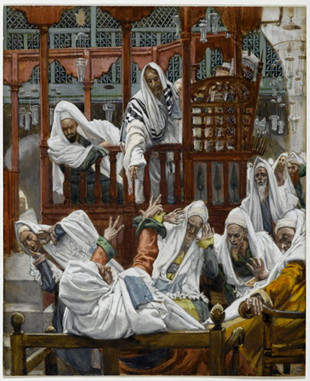4th Sunday in Ordinary Time - Teaching with Authority
A prophet is a person who claims to have a sense of vision, a special gift of perceiving the truth, and a claim of authority to proclaim that truth publicly and courageously, especially in the face of opposition. The idea of “teaching with authority” is central to our understanding of the role of the prophet in Scripture.
 Today we are beset by a host of would-be prophets who raise their voices on talk-shows, in the press and social media, and in current literature - all of them pretending to have some special gift for discerning the truth and some exclusive right to proclaim it. They tell us exactly what is wrong with modern-day society, and how precisely to cure any and all of its ills. Many of them are bigoted, pretentious, egotistical, and intolerant, especially of those who disagree with them.
Today we are beset by a host of would-be prophets who raise their voices on talk-shows, in the press and social media, and in current literature - all of them pretending to have some special gift for discerning the truth and some exclusive right to proclaim it. They tell us exactly what is wrong with modern-day society, and how precisely to cure any and all of its ills. Many of them are bigoted, pretentious, egotistical, and intolerant, especially of those who disagree with them.
So this is an appropriate moment to reflect on who are the voices that guide our lives today. An examination of conscience is necessary. Who speaks to us with authority? Whose words guide our spirits and direct our energies? Whose actions shape our minds and consciences to Jesus’ word of authority?
Is it the voice of Pope Francis who expresses concern for the poor, the persecuted and the environment? Do we turn to spiritual guides in our reading? How much sway over us have political personalities, parties, blogs and editorials?
Moses was a prophet through whom God guided, strengthened and encouraged the people during their daily struggles, enabling them to survive physically and spiritually in the desert. Jesus enters the synagogue as one who teaches as well as one who heals. Initially, it was his teaching with authority which astonished the people assembled there.
The cure of the man with the unclean spirit is not the main focus of this narrative. It only serves to emphasize the power of this "new teaching with authority." And it is this that astonished them.
It isn't hard to find evidence of evil in our world. It's also hard not to become cynical. Even if intentions are the best ever, humans suffer at the hands of powerful forces. Doesn't it seem like evil is winning and even our best efforts are not enough? "Demonic" is an appropriate description of the situation.
However, the prophetic message of the Gospel will not be drowned out. It is proclaimed quietly but strongly by faith-filled men and women whose values stand in direct contrast to those of the world.
We are called to be these faith-filled people. By our baptism we have been anointed to be prophets. And we can be assured that our proclaiming of the Gospel is done with the authority that Jesus has given us. May our prophetic witness to the Gospel preserve and strengthen the gifts of faith and freedom for future generations.
And may we accept the challenge of Jesus to live our lives in a loving way that allows the world to experience the God through us and to see His face through ours.